Room for optimism

WHILE the International Monetary Fund (IMF) has reduced its growth projection for this country in its latest World Economic Outlook report, its estimate of economic recovery remains somewhat more positive than local projections set out this month by Finance Minister Colm Imbert. There is room for optimism, if not policy error.
Mr Imbert this month, in his budget presentation, outlined a projected growth rate of two per cent for the full year, citing real progress in the non-energy sector.
But the IMF last week Tuesday released a global outlook which put TT’s growth at 2.5 per cent. This was a drop from 3.2 per cent in its April projection.
However, it is important to note the outlook was issued on the basis of statistical information available through September 25, before the outbreak of the Israel-Hamas war on October 7.
The IMF, in the notes to this specific outlook, also assumes an oil price of US$80.49 a barrel in 2023 and US$79.92 a barrel in 2024 (by way of comparison, Mr Imbert’s budget is pegged on a projected oil price assumption of US$92.50, a figure chosen after a survey of a wide range of sources, including IMF figures).
How the situation in the Middle East, which has the potential to embroil countries in the region and beyond, will affect global economic recovery remains to be seen.
Oil prices have already begun to surge upward in the last few days, presenting a mixed picture for the heavily interconnected global economy.
Within that economy there had already been, before the events of this month, little margin for policy missteps, according to the IMF.
The Russia-Ukraine war had already caused much uncertainty; the addition of yet another war compounds the difficulty of making estimates and planning.
While the IMF is still projecting growth, albeit at a slower rate, for this country, of note is the overall projection for a slowdown in the growth of global economic activity.
The forecast is for the global rate to slow from 3.5 per cent in 2022 to 3.0 per cent in 2023 and then possibly 2.9 per cent in 2024, far below the historical average of 3.8 per cent experienced in the years 2000-2019.
Inflation was, up until this month, expected to go down, but consistent monetary policy actions and frameworks were key to keeping prices anchored. These could be upended by the instability in the Middle East, which could reignite price surges dramatically and enhance geopolitical fracturing. It could also accelerate the process of deglobalisation – the dismantling of economic ties – begun by the pandemic and the Russia-Ukraine war.
This dismantling of global interconnectedness is a potential danger point, opening the door to increased political and social risk at a moment when global co-operation appears more important than ever, given specific challenges such as the climate crisis and the risk of renewed bouts of global contagion.
While the IMF’s projections appear to concur with the Government’s belief that 2023 will end on a positive note, there is absolutely no room for complacency going forward to 2024.


Comments
"Room for optimism"